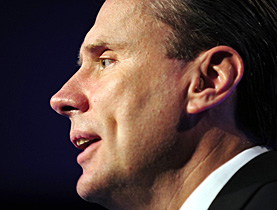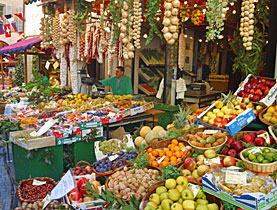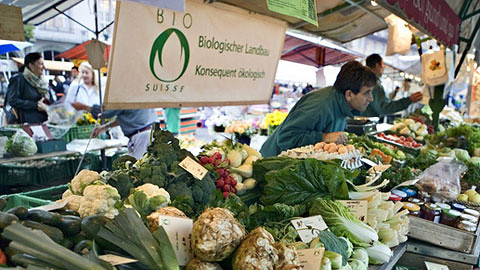Syngenta CEO promotes stronger Swiss-US ties

Michael Mack, the new president of the Swiss-American Chamber of Commerce, says Europe's resistance to genetically modified crops (GM) will not help a hungry planet.
Mack, the CEO of Syngenta, led the Basel-based agricultural concern to $3.6 billion (SFr3.9 billion) in sales for the first quarter of 2009. He was unanimously elected to the Chamber of Commerce post.
The American, 48, told swissinfo.ch what he hopes to accomplish and shared his views on how Swiss-American businesses can help feed a booming population.
However, Mack said that he believed Switzerland was “the first best example” of a country where protectionist agricultural tendencies worked well and that GM organisms would not necessarily be needed.
Mack, appointed on June 22, assumes the presidency from former Swiss Re CEO Jacques Aigrain, who resigned in February.
“From the personality to the passport, Mack was clearly our first choice,” said Martin Naville, CEO of the chamber, which promotes Swiss-US business relations.
swissinfo.ch: How do Americans contribute to Swiss businesses in ways that the European Union cannot?
Michael Mack: If you can stereotype Americans, they have a can-do attitude and are viewed as being very entrepreneurial. I think this complements Swiss management. We find that’s the case here at Syngenta.
Having an intimate knowledge of the US market is critical, since the US is the second largest export market for Switzerland and the largest direct investment for all of Swiss companies. Thirty-two per cent of Syngenta’s sales in 2008 were in North America, most of them in the US.
swissinfo.ch: As CEO of Syngenta with some 25,000 employees, you have extensive experience in the business of food. How can Swiss and American businesses help feed an ever-hungrier planet?
M.M.: As you think about the population growing by more than two billion people by 2030, it means there is going to need to be a lot more food produced. To do that in an environmentally sustainable way we are going to have to continue to get more productivity on farmland. That requires technology and this is where we play a leading role.
With Syngenta, Switzerland has the largest agricultural-inputs company in the world and we’re at one end of the food chain. In Vevey, you have the largest food company in the world, Nestlé. I’m not suggesting that the two of us are inextricably linked, but you’ve got two companies bringing a lot of innovation, investment and perspective. We have to necessarily think in very global terms with a global mindset. This gives us a great advantage.
swissinfo.ch: At the Environment Council last week in Luxembourg, 11 EU countries expressed the right to opt out of growing GM crops. Is this a mistake?
M.M.: Yes. It’s a purely political decision and it’s against any and every piece of science that is known. GM is being adopted everywhere in the world except the EU. It’s in all of Canada, South America, India, South Africa and China. Increasingly Europe is an island, and they are not standing on any science.
swissinfo.ch: What are the countries that don’t want to use GM crops risking?
M.M.: If you believe we don’t need high-productivity agriculture – and I’m not trying to being cynical here – but if you view farming as more of a hobby where just doing it OK is desirable, then GMO don’t necessarily have to be part of your toolbox. If you have to turn a screw with a regular screwdriver, that’s one thing. If you have 100 screws and you want to do it fast, do I really need to describe to you the benefits of a high-speed drill?
swissinfo.ch: Switzerland has a protective stance with farmers and put a moratorium on GMO. Do you see those changing?
M.M.: One of Switzerland’s greatest natural resources is that it is a beautiful country that brings in a lot of tourism. If the Swiss could lower their consumption spending by one per cent by applying high productivity farming, they probably would not do it if it requires changing their approach to how they think about food. Countries like Switzerland are a good example where such things as GM food would be very difficult and perhaps commercially inadvisable.
swissinfo.ch: In a speech before the Chamber last week, Justice Minister Eveline Widmer-Schlumpf thanked the group for supporting the Swiss government in its position in the UBS-US tax strife and said such things would not be forgotten. How would you like to see the government return the favour?
M.M.: The spirit in which she intended it and certainly the spirit in which I received it is that with our filing of a Friend of the Court brief in Florida, the government merely took note that a key business forum stepped forward and supported them in a time of a small crisis.
What I really appreciate about Switzerland is a tendency to want to do things in a friendly, quiet and cooperative way. They aren’t done in a moment but over weeks and months and in some cases years of dialogue and bilateral engagement. It’s a country where change does take place but in a thoughtful and methodical way.
swissinfo.ch: Does that slow methodical approach clash with the American go-get ’em attitude?
M.M.: It’s different. The pace of things here and the value the Swiss place on quality and quality of life and the value of enduring relationships, these are not antithetical to being fast. The business of “fast get it done” is not valued for all the right reasons. I don’t mean that negatively. Here at Syngenta we appreciate the high quality dialogue that proceeds at an appropriate pace.
swissinfo.ch: The Organisation for Economic Co-operation and Development just forecast a sharper decline in Switzerland than expected. In your opinion, are governments in Switzerland and the US taking appropriate steps to bring figures back into the black?
M.M.: Practically every country and every company has had decline greater than they thought. No one foresaw the speed and depth of economic decline that started deep in the third quarter of 2008. I think coming off so many years of strong economic momentum, it is hard to gauge that. We need to look through the predictions and recognise there is still more uncertainty than certainty.
Tim Neville, swissinfo.ch
Michael Mack grew up in Detroit and has a degree in economics from Kalamazoo College in Michigan. He also studied at the University of Strasbourg and has an MBA from Harvard University.
He was Chief Operating Officer of Seeds (2004–2007) and Head of Crop Protection, NAFTA Region (2002–2004) for Syngenta.
Prior to this, he was president of the global paper division of Imerys, a French mining and pigments concern. He was executive vice president, Americas and Pacific region, in addition to being an executive director of the board. From 1987 to 1996 he held various roles with Mead Corporation.
The Swiss American Chamber is part of a larger “AmCham” network spread around the globe.
The Swiss division aims to promote better business relations with the US and provides information on doing business in these markets. It has 2,500 members. Michael Mack was unanimously elected to a one-year term. He can serve for up to three years as president.

In compliance with the JTI standards
More: SWI swissinfo.ch certified by the Journalism Trust Initiative




You can find an overview of ongoing debates with our journalists here. Please join us!
If you want to start a conversation about a topic raised in this article or want to report factual errors, email us at english@swissinfo.ch.